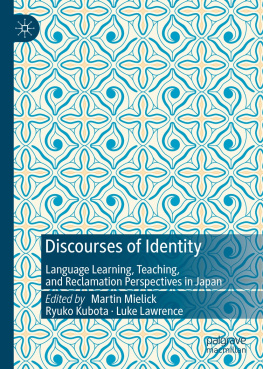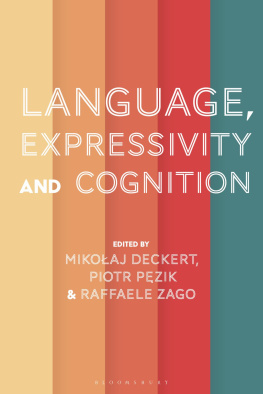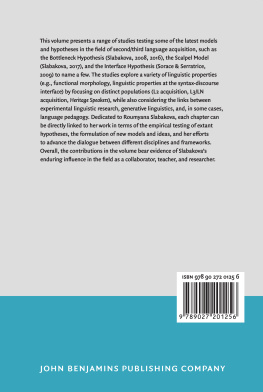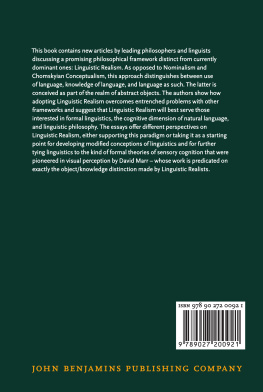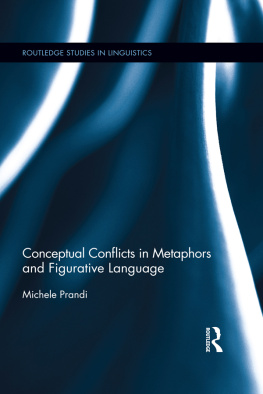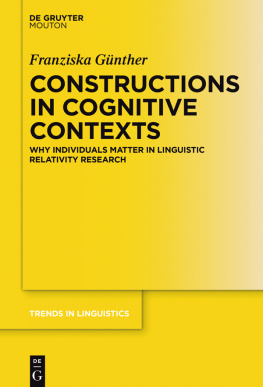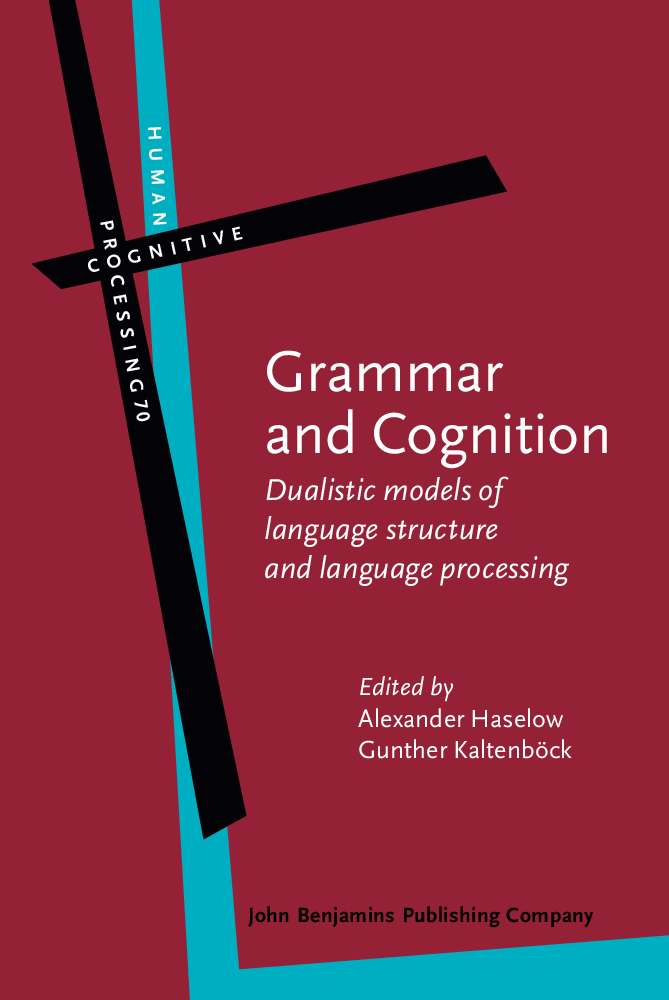

Grammar and Cognition
Dualistic models of language structure and language processing
Alexander Haselow & Gunther Kaltenbck
doi: 10.1075/hcp.70
ISBN: 978 90 272 6060 4 (ebook)
Cataloging-in-Publication Data available from Library of Congress:
LCCN 2020030870
2020 John Benjamins B.V.
No part of this book may be reproduced in any form, by print, photoprint, microfilm, or any other means, without written permission from the publisher.
John Benjamins Publishing Company https://benjamins.com
John Benjamins Publishing Company
Amsterdam/Philadelphia
Preface
This volume has its origin in an international workshop held at the University of Rostock on 12 March 2018 with the titleOne Brain-Two Grammars? Dualistic Approaches to Language and Cognition. The aim of the workshop was to bring togetherresearchers from different research fields to discuss evidence for and against dualistic approaches to linguistic structure, languageprocessing and cognition. We are greatly indebted to all the participants of this workshop, both the speakers for their presentations andthe members of the audience for the stimulating and constructive discussions.
The written versions of the papers have gone through a selective peer-reviewing process with each chapter having been reviewedanonymously by two referees as well as the editors. We would like to thank the contributors for their patience and excellent cooperation inthe reviewing process and we are extremely grateful to all the external reviewers for their time and expertise, namely Karin Aijmer, MathieuAvanzi, Laurel Brinton, Andreas Buerki, Ludivine Crible, Liesbeth Degand, Lachlan McKenzie, Gnther Radden, Nikolaus Ritt, Stefan Schneider,Elizabeth Traugott, Alison Wray, Vitor Zimmerer.
We also wish to thank the series editors Klaus-Uwe Panther and Linda L. Thornburg and Benjamins publishers for their supportand the opportunity to publish this book in the Human Cognitive Processing: Cognitive Foundations of Language Structure andUse Series. Finally, special thanks goes to Gerlinde Trinkl for her invaluable help with formatting and proof-reading of themanuscript.
Mnster (Germany), Graz (Austria), May 2020
Alexander Haselow, Gunther Kaltenbck
The brain and the mind behind grammar Dualistic approaches in grammar research and (neuro)cognitive studies of language
Alexander Haselow & Gunther Kaltenbck University of Mnster | University of Graz
Introduction : Two traditions of grammatical research
Grammar researchers are not primarily concerned with what happens in the minds or brains of language users but rather with evidenced language behavior: in the study of grammar, the linguist attempts to understand and explain the structures in language using off-line data coming from introspection (e.g. intuitions on grammaticality), elicitation experiments, or the analysis of either written records of language or transcripts of spoken language. This information may then be used to speculate on possible mental and neural correlates of grammar, but they do so indirectly, through the process of inference. In contrast, cognitive and neuroimaging approaches access these cognitive and neurological data more directly by using online brain measurements or behavioral patterns, which provide immediate access to the underlying cognitive and neural processes involved in the production and processing of language.
This volume intends to bring both research traditions together, based on our conviction that each approach can enrich and fertilize the other: results deriving from off-line, product-based data can provide important theoretical underpinnings relevant for investigations into the underlying neurocognitive processes, and the study of neurocognitive processes can show how and why the products have the shape they do under the processing constraints inherent in participants. In this respect, we follow other, more recent lines of research on modelling grammar which exhibit an increasing reorientation from pure theory-internal toward cognition-based approaches (e.g. ).
The present volume is devoted to a discussion of what we call the Cognitive Dualism Hypothesis (CDH). The central idea of this hypothesis, which has been proposed and discussed in various lines of recent linguistic, psychological and neurological research, is that human cognitive activity in general and linguistic cognition in particular cannot reasonably be reduced to a single, monolithic system of mental processing, but that they have a dualistic organization. Such a dualism has been proposed, for instance, in psychological work on brain activity ( ).
(1)
novel speech vs. formulaic speech
analytic processing vs. holistic processing
propositional representation vs. discourse representation,
linear-hierarchical structures vs. linear (flat) structures
structural integration vs. structural aggregation
sentence grammar vs. thetical grammar
microgrammar vs. macrogrammar
clausal constituents vs.extra-clausal constituents
However, as the term hypothesis implies, the debate is open to evidence for and against the hypothesis. This volume thus does not engage in a hidebound defense of dualism, but brings together authors from different research fields who found supportive evidence for the CDH in their data while also accommodating critical views.
The distinctions presented in () derive from a wide range of methodological approaches and theoretical frameworks, but there is a more general assumption underlying them which we will take up and develop further with this volume: whatever the specific conceptualization of a dualistic organization of language structure and linguistic processing may be, we can safely assume that it has a cognitive basis. In other words, language use and behavior may be accounted for in independent theories, but these theories in turn will ultimately have to be based on a theory of how language users perceive, interpret, mentally represent, memorize, evaluate, plan, produce and understand linguistic discourse more generally. This topic thus invites a cross-disciplinary approach involving a broader range of research fields that deal with the relation between language and cognition. These include, next to linguistics, cognitive psychology, psycholinguistics and neurolinguistics. The present volume wants to take a step toward overcoming scientific departmentalism and bringing together theoretical approaches and empirical findings from a wide range of research fields and methodological approaches.
The contributors to this volume all participated in an international workshop titled One Brain-Two Grammars? Dualistic Approaches to Language and Cognition, held at the University of Rostock on 12 March 2018. The aim of the workshop was to bring together researchers from different fields to discuss evidence for and against dualistic approaches to language structure and language processing. This is, as mentioned above, also the aim of this volume, which presents a cutting-edge discussion of dualistic approaches more generally as well as studies of specific linguistic phenomena and their relation to dualistic models. This volume therefore sees itself as making a timely contribution to an ongoing and pertinent discussion in linguistics with a view to enhancing our understanding of how language is organized in the brain.


